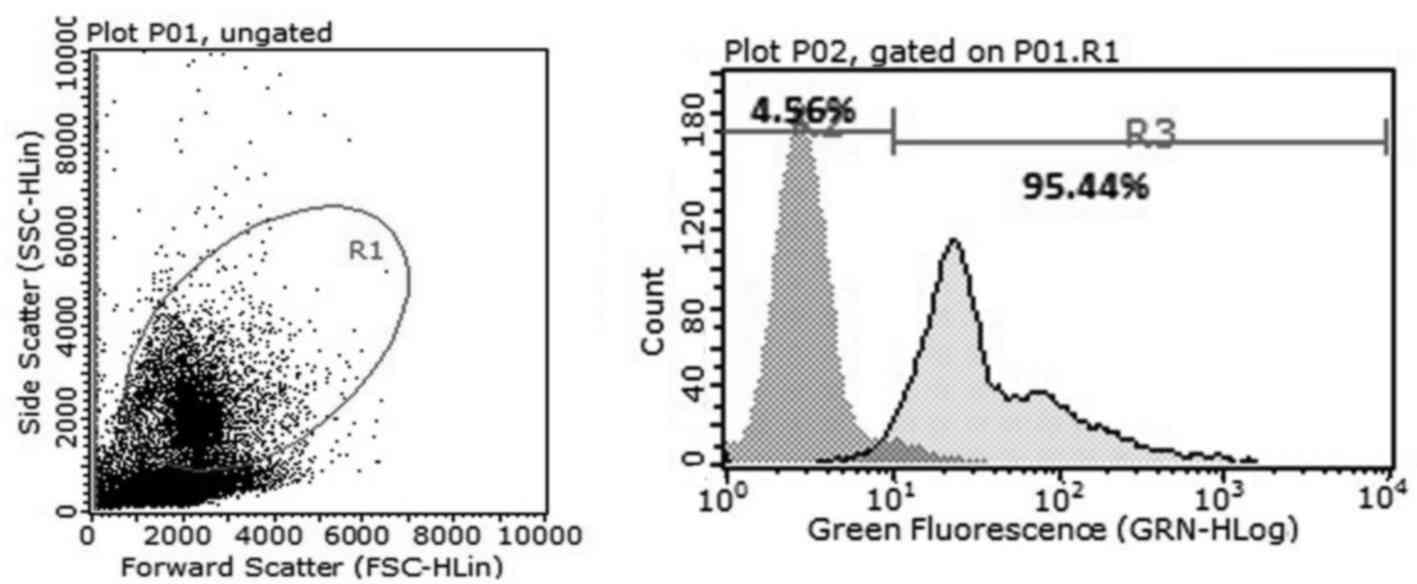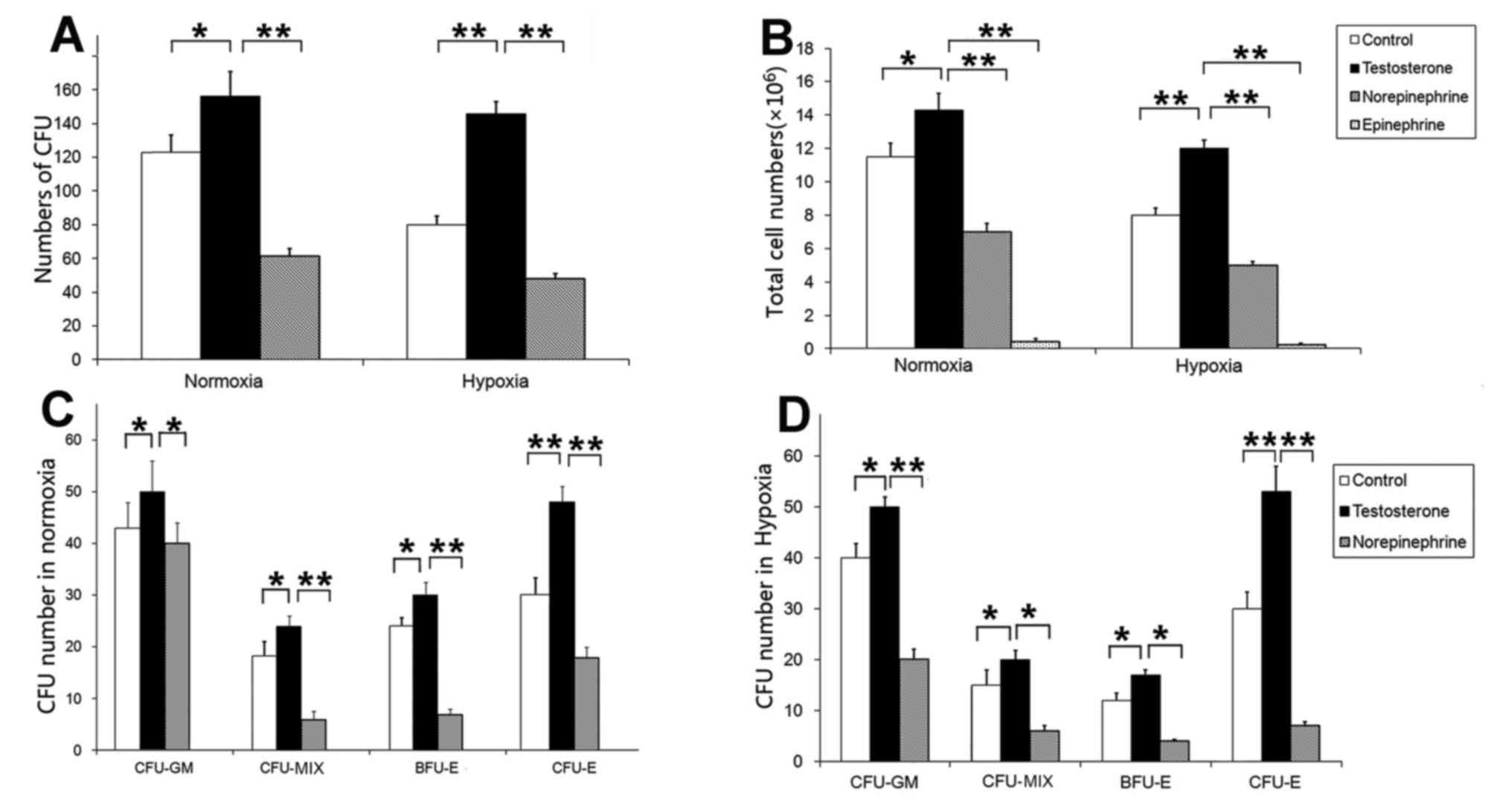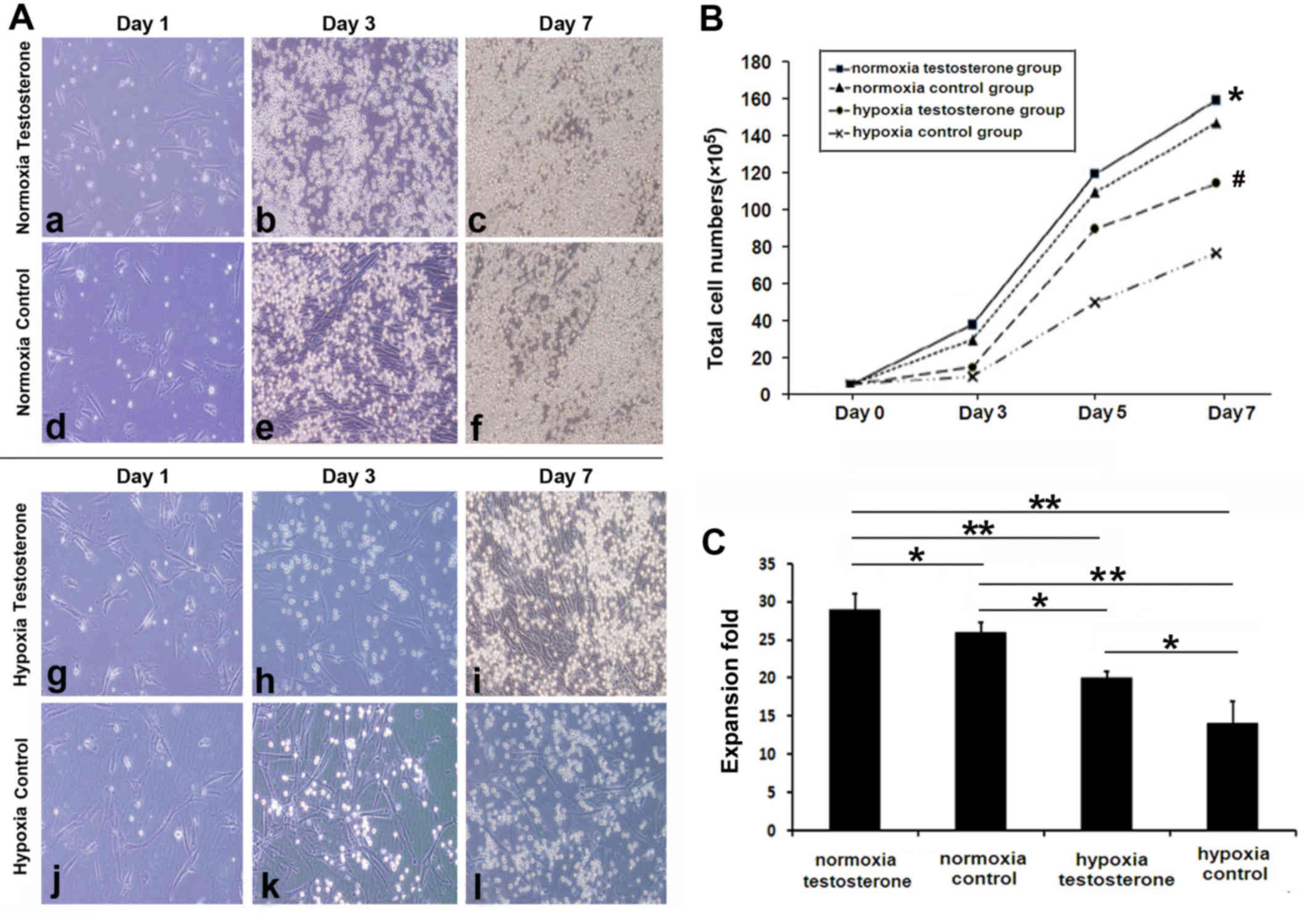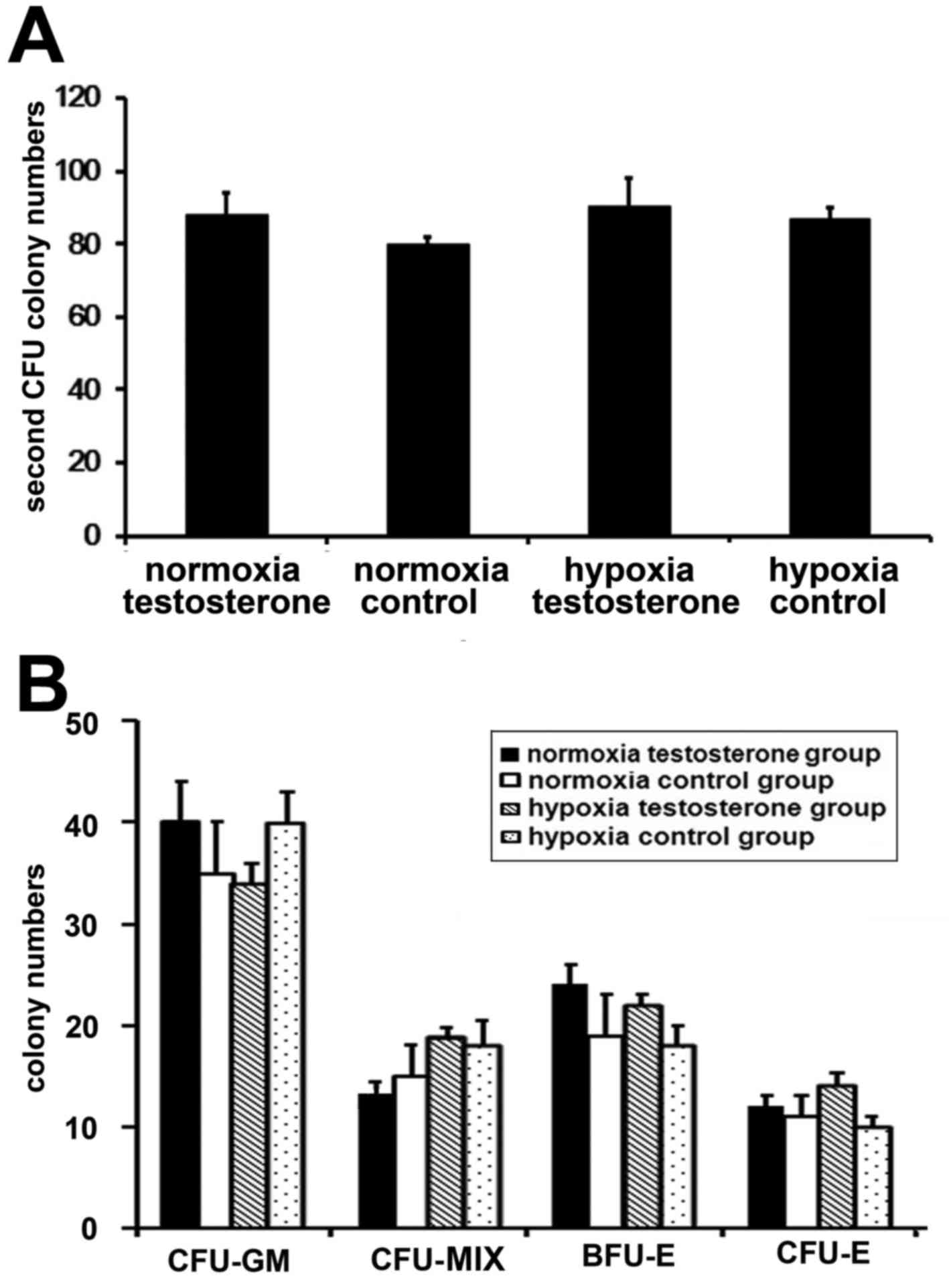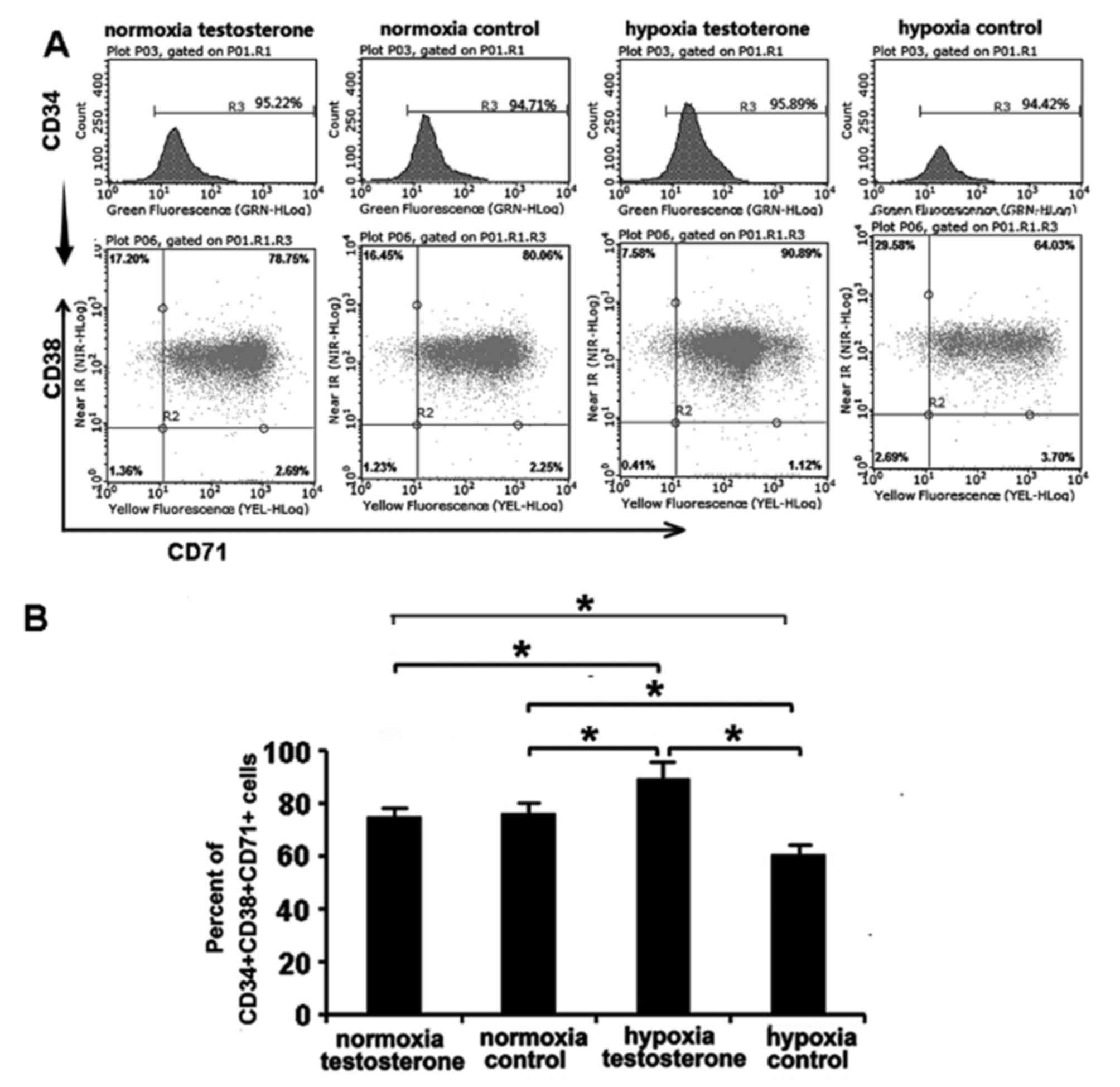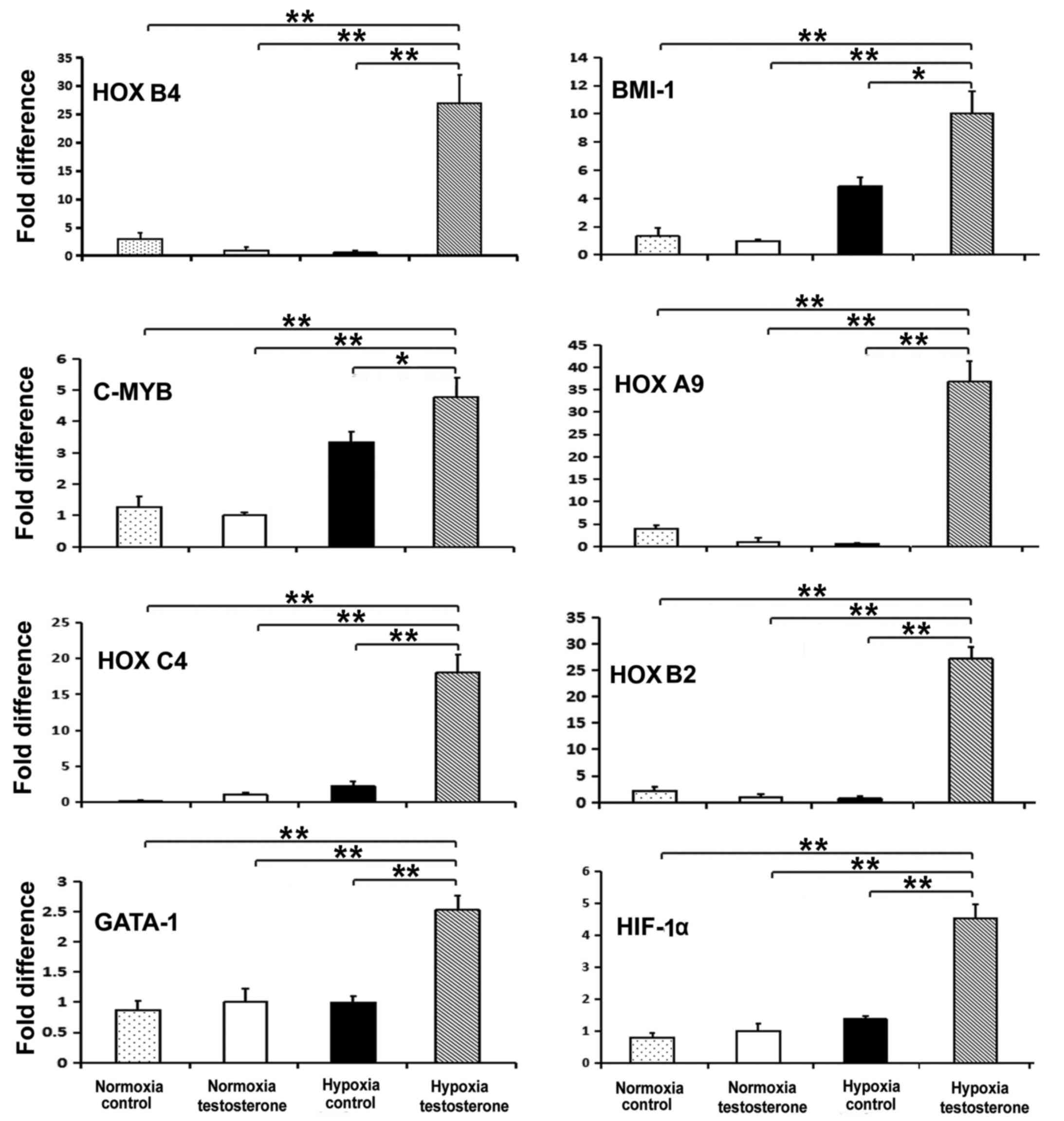|
1
|
Walasek MA, van Os R and de Haan G:
Hematopoietic stem cell expansion: Challenges and opportunities.
Ann N Y Acad Sci. 1266:138–150. 2012. View Article : Google Scholar : PubMed/NCBI
|
|
2
|
Möbest D, Mertelsmann R and Henschler R:
Serum-free ex vivo expansion of CD34(+) hematopoietic progenitor
cells. Biotechnol Bioeng. 60:341–347. 1998. View Article : Google Scholar : PubMed/NCBI
|
|
3
|
Ballen KK, Gluckman E and Broxmeyer HE:
Umbilical cord blood transplantation: The first 25 years and
beyond. Blood. 122:491–498. 2013. View Article : Google Scholar : PubMed/NCBI
|
|
4
|
Rocha V, Wagner JE Jr, Sobocinski KA,
Klein JP, Zhang MJ, Horowitz MM and Gluckman E: Graft-versus-host
disease in children who have received a cord-blood or bone marrow
transplant from an HLA-identical sibling. Eurocord and
International Bone Marrow Transplant Registry Working Committee on
Alternative Donor and Stem Cell Sources. N Engl J Med.
342:1846–1854. 2000. View Article : Google Scholar : PubMed/NCBI
|
|
5
|
Foeken LM, Green A, Hurley CK, Marry E,
Wiegand T and Oudshoorn M: Monitoring the international use of
unrelated donors for transplantation: The WMDA annual reports. Bone
Marrow Transplant. 45:811–818. 2010. View Article : Google Scholar : PubMed/NCBI
|
|
6
|
Gao L, Chen X, Zhang X, Liu Y, Kong P,
Peng X, Liu L, Liu H and Zeng D: Human umbilical cord blood-derived
stromal cell, a new resource of feeder layer to expand human
umbilical cord blood CD34+ cells in vitro. Blood Cells,
Molecules and Diseases. 36:322–328. 2006. View Article : Google Scholar
|
|
7
|
Horwitz ME and Frassoni F: Improving the
outcome of umbilical cord blood transplantation through ex vivo
expansion or graft manipulation. Cytotherapy. 17:730–738. 2015.
View Article : Google Scholar : PubMed/NCBI
|
|
8
|
Pawliuk R, Eaves C and Humphries RK:
Evidence of both ontogeny and transplant dose-regulated expansion
of hematopoietic stem cells in vivo. Blood. 88:2852–2858.
1996.PubMed/NCBI
|
|
9
|
Iscove NN and Nawa K: Hematopoietic stem
cells expand during serial transplantation in vivo without apparent
exhaustion. Curr Biol. 7:805–808. 1997. View Article : Google Scholar : PubMed/NCBI
|
|
10
|
Osawa M, Hanada K, Hamada H and Nakauchi
H: Long term lymp hematopoietic reconstitution by a single
CD34-low/negative hematopoietic stem cell. Science. 273:242–245.
1996. View Article : Google Scholar : PubMed/NCBI
|
|
11
|
Sauvageau G, Iscove NN and Humphries RK:
In vitro and in vivo expansion of hematopoietic stem cells.
Oncogene. 23:7223–7232. 2004. View Article : Google Scholar : PubMed/NCBI
|
|
12
|
Schugar RC, Robbins PD and Deasy BM: Small
molecules in stem cell self-renewal and differentiation. Gene
Therapy. 15:126–135. 2008. View Article : Google Scholar : PubMed/NCBI
|
|
13
|
Hermitte F, de la Grange Brunet P, Belloc
F, Praloran V and Ivanovic Z: Very low O2 concentration (0. 1%)
favors G0 return of dividing CD34+ cells. Stem Cells.
24:65–73. 2006. View Article : Google Scholar : PubMed/NCBI
|
|
14
|
Ivanovic Z, Hermitte F, de la Grange
Brunet P, Dazey B, Belloc F, Lacombe F, Vezon G and Praloran V:
Simultaneous maintenance of human cord blood SCID-repopulating
cells and expansion of committed progenitors at low O2
concentration (3%). Stem Cells. 22:716–724. 2004. View Article : Google Scholar : PubMed/NCBI
|
|
15
|
Ivanovic Z, Dello Sbarba P, Trimoreau F,
Faucher JL and Praloran V: Primitive human HPCs are better
maintained and expanded in vitro at 1 percent oxygen than at 20
percent. Transfusion. 12:1482–1488. 2000. View Article : Google Scholar
|
|
16
|
Eliasson P, Rehn M, Hammar P, Larsson P,
Sirenko O, Flippin LA, Cammenga J and Jönsson JI: Hypoxia mediates
low cell-cycle activity and increases the proportion of long-term
reconstituting hematopoietic stem cells during in vitro culture.
Experimental Hematology. 38:301–310. 2010. View Article : Google Scholar : PubMed/NCBI
|
|
17
|
Rehn M, Olsson A, Reckzeh K, Diffner E,
Carmeliet P, Landberg G and Cammenga J: Hypoxic induction of
vascular endothelial growth factor regulates murine hematopoietic
stem cell function in the low-oxygenic niche. Blood. 118:1534–1543.
2011. View Article : Google Scholar : PubMed/NCBI
|
|
18
|
Penn A, Mohr AM, Shah SG, Sifri ZC, Kaiser
VL, Rameshwar P and Livingston DH: Dose-response relationship
between norepinephrine and erythropoiesis: Evidence for a critical
threshold. J Surg Res. 163:85–90. 2010. View Article : Google Scholar
|
|
19
|
Kröpfl JM, Stelzer I, Mangge H, Pekovits
K, Fuchs R and Allard N: Exercise-induced norepinephrine decreases
circulating hematopoietic stem and progenitor cell colony-forming
capacity. PLoS One. 9:106–120. 2014. View Article : Google Scholar
|
|
20
|
Kim SW, Hwang JH, Cheon JM, Park NS, Park
SE, Park SJ, Yun HJ, Kim S and Jo DY: Direct and indirect effects
of androgens on survival of hematopoietic progenitor cells in
vitro. J Korean Med Sci. 20:409–416. 2005. View Article : Google Scholar : PubMed/NCBI
|
|
21
|
Beckman B and Fisher JW: Decreased
erythroidcolony-forming cell response of XTfm/Y mice to
testosterone and 5 betadihydrotestosterone. Endocrinology.
107:1587–1592. 1980. View Article : Google Scholar : PubMed/NCBI
|
|
22
|
Huang CK, Luo J, Lee SO and Chang C:
Concise review: Androgen receptor differential roles in
stem/progenitor cells including prostate, embryonic, stromal and
hematopoietic lineages. Stem Cells. 32:2299–2308. 2014. View Article : Google Scholar : PubMed/NCBI
|
|
23
|
Chen C, Cao J, Song X, Zeng L, Li Z, Li Y
and Xu K: Adrenaline administration promotes the efficiency of
granulocyte colony stimulating factor-mediated hematopoietic stem
and progenitor cell mobilization in mice. Int J Hematol. 97:50–57.
2013. View Article : Google Scholar : PubMed/NCBI
|
|
24
|
Duchez P, Chevaleyre J, de la Grange
Brunet P, Vlaski M, Boiron JM, Wouters G and Ivanovic Z:
Cryopreservation of hematopoietic stem and progenitor cells
amplified ex vivo from cord blood CD34+ cells.
Transfusion. 53:2012–2019. 2013. View Article : Google Scholar : PubMed/NCBI
|
|
25
|
Dumont N, Boyer L, Émond H, Celebi-Saltik
B, Pasha R, Bazin R, Mantovani D, Roy DC and Pineault N: Medium
conditioned with mesenchymal stromal cell-derived osteoblasts
improves the expansion and engraftment properties of cord blood
progenitors. Exp Hematol. 42:741–752. 2014. View Article : Google Scholar : PubMed/NCBI
|
|
26
|
Zhuang Y, Li D, Fu J, Shi Q, Lu Y and Ju
X: Comparison of biological properties of umbilical cord-derived
mesenchymal stem cells from early and late passages:
Immunomodulatory ability is enhanced in aged cells. Mol Med Rep.
11:166–174. 2015. View Article : Google Scholar : PubMed/NCBI
|
|
27
|
Robinson S, Niu T, de Lima M, Ng J, Yang
H, McMannis J, Karandish S, Sadeghi T, Fu P and del Angel M: Ex
vivo expansion of umbilical cord blood. Cytotherapy. 3:243–250.
2005. View Article : Google Scholar
|
|
28
|
Livak KJ and Schmittgen TD: Analysis of
relative gene expression data using real-time quantitative PCR and
the 2 (-Delta Delta C(T)) Method. Methods. 25:402–408. 2001.
View Article : Google Scholar : PubMed/NCBI
|
|
29
|
Bock TA, Ziegler BL, Bühring HJ, Scheding
S, Brugger W and Kanz L: Characterization of purified and ex vivo
manipulated human hematopoietic progenitor and stem cells in
xenograft recipients. Ann N Y Acad Sci. 872:200–207. 1999.
View Article : Google Scholar : PubMed/NCBI
|
|
30
|
Frascoli M, Proietti M and Grassi F:
Phenotypic analysis and isolation of murine hematopoietic stem
cells and lineage-committed progenitors. J Vis Exp. 65:pii: 3736.
2012.
|
|
31
|
Zhang QS, Benedetti E, Deater M, Schubert
K, Major A, Pelz C, Impey S, Marquez-Loza L, Rathbun RK, Kato S, et
al: Oxymetholone therapy of fanconi anemia suppresses osteopontin
transcription and induces hematopoietic stem cell cycling. Stem
Cell Reports. 4:90–102. 2015. View Article : Google Scholar : PubMed/NCBI
|
|
32
|
Gallien-Lartigue O: Differential effects
of external agents on the G1-S transit rate of murine pluripotent
hemopoietic stem cells (CFUs) after their release from G0. Stem
Cells. 2:218–228. 1982.PubMed/NCBI
|
|
33
|
Freedman MH and Saunders EF: Factors
affecting erythroid colony growth (CFU-E) from human marrow. Exp
Hematol. 5:250–253. 1977.PubMed/NCBI
|
|
34
|
Reissmann KR, Udupa KB and Kawada K:
Effects of erythropoietin and androgens on erythroid stem cells
after their selective suppression by BCNU. Blood. 44:649–657.
1974.PubMed/NCBI
|
|
35
|
Katayama Y, Battista M, Kao WM, Hidalgo A,
Peired AJ, Thomas SA and Frenette PS: Signals from the sympathetic
nervous system regulate hematopoietic stem cell egress from bone
marrow. Cell. 124:407–421. 2006. View Article : Google Scholar : PubMed/NCBI
|
|
36
|
Ivanović Z, Bartolozzi B, Bernabei PA,
Cipolleschi MG, Rovida E, Milenković P, Praloran V and Dello Sbarba
P: Incubation of murine bone marrow cells in hypoxia ensures the
maintenance of marrow-repopulating ability together with the
expansion of committed progenitors. Br J Haematol. 108:424–429.
2000. View Article : Google Scholar : PubMed/NCBI
|
|
37
|
Ivanović Z, Dello Sbarba P, Trimoreau F,
Faucher JL and Praloran V: Primitive human HPCs are better
maintained and expanded in vitro at 1 percent oxygen than at 20
percent. Transfusion. 40:1482–1488. 2000. View Article : Google Scholar : PubMed/NCBI
|
|
38
|
Ivanovic Z, Belloc F, Faucher JL,
Cipolleschi MG, Praloran V and Dello Sbarba P: Hypoxia maintains
and interleukin-3 reduces the pre-colony-forming cell potential of
dividing CD34(+) murine bone marrow cells. Experimental Hematology.
30:67–73. 2002. View Article : Google Scholar : PubMed/NCBI
|
|
39
|
Ishikawa Y and Ito T: Kinetics of
hemopoietic stem cells in a hypoxic culture. Eur J Haematol.
40:126–129. 1988. View Article : Google Scholar : PubMed/NCBI
|
|
40
|
Lu L and Broxmeyer HE: Comparative
influences of phytohemagglutinin-stimulated leukocyte conditioned
medium, hemin, prostaglandin E and low oxygen tension on colony
formation by erythroid progenitor cells in normal human bone
marrow. Exp Hematol. 13:989–993. 1985.PubMed/NCBI
|
|
41
|
Huang CK, Tsai MY, Luo J, Kang HY, Lee SO
and Chang C: Suppression of androgen receptor enhances the self
renewal of mesenchymal stem cells through helevated expression of
EGFR. Biochim Biophys Acta. 1833:1222–1234. 2013. View Article : Google Scholar : PubMed/NCBI
|
|
42
|
Chang CY, Hsuuw YD, Huang FJ, Shyr CR,
Chang SY, Huang CK, Kang HY and Huang KE: Androgenic and
antiandrogenic effects and expression of androgen receptor in mouse
embryonic stem cells. FertilSteril. 85:1195–1203. 2006.
|
|
43
|
Rogers HM, Yu X, Wen J, Smith R, Fibach E
and Noguchi CT: Hypoxia alters progression of the erythroid
program. Exp Hematol. 1:17–27. 2008. View Article : Google Scholar
|
|
44
|
Fried W and Morley C: Effects of
androgenic steroids on erythropoiesis. Steroids. 46:799–826. 1985.
View Article : Google Scholar : PubMed/NCBI
|
|
45
|
Huang CK, Luo J, Lee SO and Chang C:
Concise review: Androgen receptor differential roles in
stem/progenitor cells including prostate, embryonic, stromal and
hematopoietic lineages. Stem Cells. 9:2299–2308. 2014. View Article : Google Scholar
|
|
46
|
Calado RT, Yewdell WT, Wilkerson KL, Regal
JA, Kajigaya S, Stratakis CA and Young NS: Sex hormones, acting on
the TERT gene, increase telomerase activity in human primary
hematopoietic cells. Blood. 114:2236–2243. 2009. View Article : Google Scholar : PubMed/NCBI
|
|
47
|
Lane TA: Umbilical cord blood grafts for
hematopoietic transplantation in adults: A cup half empty or half
full? Transfusion. 45:1027–1034. 2005. View Article : Google Scholar : PubMed/NCBI
|















